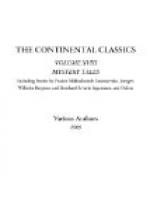On her right hand sat her eldest son, Thomas Bardy, a man of between fifty and sixty. With a haughty and commanding countenance, penetrating glance, lofty figure, and noble mien, he was a true type of that ancient aristocracy which is now beginning to die out.
Opposite to him, at the old lady’s left hand, sat the darling of the family—a lovely girl of about fifteen. Her golden hair fell in luxuriant tresses round a countenance of singular beauty and sweetness. The large and lustrous deep-blue eyes were shaded by long dark lashes, and her complexion was pale as the lily, excepting when she smiled or spoke, and a slight flush like the dawn of morning overspread her cheeks.
Jolanka was the orphan child of a distant relative, whom the Bardys had adopted. They could not allow one who bore their name to suffer want; and it seemed as if each member of the family had united to heap affection and endearment on the orphan girl, and thus prevented her from feeling herself a stranger among them.
There were still two other female members of the family: Katalin, the old lady’s daughter, who had been for many years a widow; and the wife of one of her sons, a pretty young woman, who was trying to teach a little prattler at her side to use the golden spoon which she had placed in his small, fat hand, while he laughed and crowed, and the family did their best to guess what he said, or what he most preferred.
Opposite to them there sat two gentlemen. One of them was the husband of the young mother, Jozsef Bardy—a handsome man of about thirty-five, with regular features, and black hair and beard; a constant smile beamed on his gay countenance, while he playfully addressed his little son and gentle wife across the table. The other was his brother, Barnabas—a man of herculean form and strength. His face was marked by smallpox; he wore neither beard or mustache, and his hair was combed smoothly back, like a peasant’s. His disposition was melancholy and taciturn; but he seemed constantly striving to atone, by the amiability of his manners, for an unprepossessing exterior.
Next to him sat a little cripple, whose pale countenance bore that expression of suffering sweetness so peculiar to the deformed, while his lank hair, bony hands, and misshapen shoulders awakened the beholder’s pity. He, too, was an orphan—a grandchild of the old lady’s; his parents had died some years before.
Two little boys of about five years old sat opposite to him. They were dressed alike, and the resemblance between them was so striking that they were constantly mistaken. They were twin-children of the young couple.
At the lower end of the table sat Imre Bardy, a young man of twenty, whose handsome countenance was full of life and intelligence, his figure manly and graceful, and his manner courteous and agreeable. A slight moustache was beginning to shade his upper lip, and his dark hair fell in natural ringlets around his head. He was the only son of the majoresco, Tamas Bardy, and resembled him much in form and feature.




